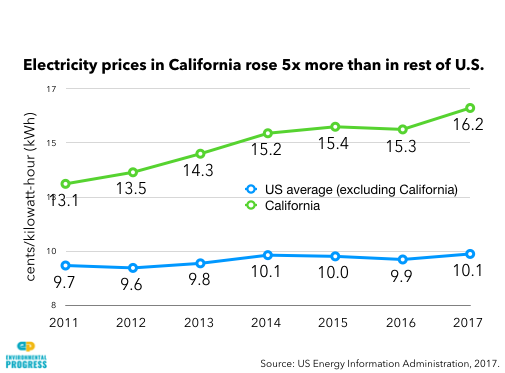“Get Ready for Sticker Shock on California’s Last-Minute Clean Energy Proposals” – Even California Reconsiders Costly Energy Mandates
The following is a Viewpoint from Barry Moline, the executive director of the California Municipal Utilities Association. This article originally appeared in Utility Dive:
It’s a good time for Californians to hang on to their wallets.
With one more day to go in the state’s legislative session, lawmakers are considering many proposals that will raise consumers’ electric bills significantly.
There’s no shortage of well-intentioned ideas designed to advance renewable energy, but unfortunately, they would commit Californians to resource decisions for the next 10 years and limit investment in lower-cost technologies. One would, for instance, expand California’s electricity grid to include other states (AB 813), while another would set a mandate that California utilities must buy expensive electricity from geothermal plants (AB 893).
Rather than allow this careful consideration to occur, the Legislature is now hurriedly considering several concepts that, together, could substantially increase the cost of electricity. In addition to the anti-consumer grid regionalization plan and high-priced geothermal mandate, the ideas include a requirement (also in AB 893) to build and buy unnecessary renewable energy projects that are already oversupplying our state (but take advantage of expiring federal tax credits for renewables companies), and a mandate to buy electricity from one giant, high-priced pumped-hydropower energy storage project built by one private company, NextEra (AB 2787). Why would the legislature advantage one single company?
Utilities generally buy electricity in competitive markets. This helps ensure that costs are the lowest possible. The problem with mandates is they create a captive market and generally drive prices up – because with a mandate there is no competition. For example, in 2016 the Legislature enacted a mandate on utilities to buy electricity produced from biomass plants — that is, burning trees. Almost immediately, the price of electricity jumped about 25 percent for biomass power.
It’s smart to consider new technologies, but let’s not lose sight that many of them come with a big price tag. Some are not rapidly adopted because they are too expensive or don’t produce according to their promise, while others only benefit a small group of investors who want to impose higher costs on all so they can profit off the backs of 40 million Californians.
That’s why it makes sense we have a fair and open process to choose the best solutions that deliver clean energy for the lowest cost, making sure the lights stay on. If we don’t encourage clean energy competition, electric bills will rise and our wallets will be lighter for it. We need to say no to costly energy mandates.
IO commentary: As you can see in the graph below, the cost of electricity in California is far outstripping the cost of electricity in the rest of the nation. This unquestionably due in large part to the state’s renewable energy mandate, which is the most aggressive in the continental United States.

The group Environmental Progress Notes:
“Between 2011 and 2017, California’s electricity prices rose five times faster than they did nationally. Today, Californians pay 60 percent more, on average, than the rest of the nation, for residential, commercial and industrial electricity.”
“California’s high penetration of intermittent renewables such as solar and wind are likely a key factor in higher prices. Economists agree that “the dominant policy driver in the electricity sector [in California] has unquestionably been a focus on developing renewable sources of electricity generation.”
It is truly a sign that things must be getting out of hand in California when someone in the Golden State advocates for public officials to pump the brakes on renewable energy mandates.